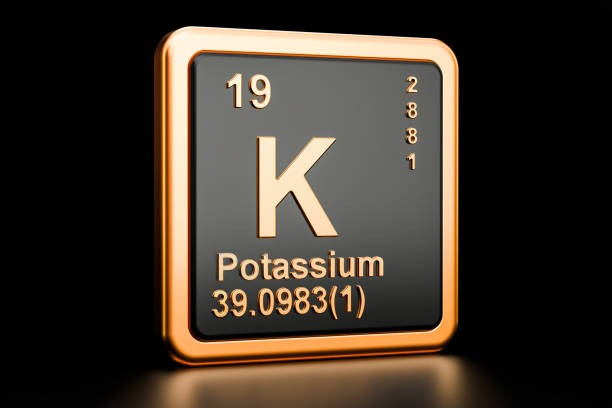When we talk about important minerals for our body, potassium levels is often forgotten—but it shouldn’t be. This helpful mineral supports a healthy heart, keeps our muscles working well, helps nerves send signals, and controls the balance of fluids in the body. Potassium quietly takes care of many important jobs inside us.

🌟 Why Is Potassium Important?
Potassium is an electrolyte—a mineral that carries a small electrical charge to help:
- Regulate heartbeat and blood pressure
- Support nerve signals and muscle contractions
- Maintain proper fluid balance and cellular function
Your body doesn’t make potassium on its own, so it has to be absorbed from the foods you eat.
⚠️ What Happens When Potassium Levels Go Wrong?
🧯High Potassium (Hyperkalemia)
Too much potassium in the blood can be life-threatening, especially for individuals with kidney issues. It may cause:
- Irregular heartbeat or palpitations
- Muscle weakness
- Nausea or numbness
- In severe cases, it can lead to cardiac arrest
Common causes: Kidney dysfunction, certain medications, excessive potassium supplements.
🛑 Foods to Avoid in Hyperkalemia:
If you’re diagnosed with high potassium levels, your doctor may advise you to limit or avoid high-potassium foods, such as:
- Fruits: Avocados, bananas, kiwis, bel and apricots
- Vegetables: Potatoes, Sweet potatoes, spinach, broccoli, cauliflower
- Legumes & Nuts: Pistachios, lentils, almond, and kidney beans, Moong
- Salt substitutes (often contain potassium chloride)
📌 Always consult a renal dietitian or your doctor to customize a low-potassium meal plan that fits your health needs.
🥴Low Potassium (Hypokalemia)
On the other hand, not getting enough potassium may lead to:
- Muscle cramps and spasms
- Fatigue and weakness
- Constipation
- Irregular heart rhythms
Common causes: Poor diet, excessive sweating, vomiting, diarrhea, or use of diuretics.
✅ Essential Tips to Maintain Healthy Potassium Levels
Whether you need to increase or limit potassium intake depends on your individual health condition. Here are some general tips to stay in the healthy range:

1. 🥦Eat a Balanced Diet
Include potassium-rich foods such as:
- Bananas, oranges, kiwis
- Leafy greens (spinach, kale, )
- Potatoes, sweet potatoes
- Beans, lentils, avocados
- Coconut water (in moderation)
Note: If you have kidney problems or hyperkalemia, you may need to avoid these foods. Always consult your doctor.
2. 💧Stay Well Hydrated
Dehydration can upset electrolyte balance such as concentrate potassium level in the blood. When you’re dehydrated, your body loses important minerals in sweat and urine. To avoid this
- drink at least 8–10 glasses of water per day
- Boost fluid intake if you exercise or live in a hot environment
- Add hydrating foods such as cucumbers, watermelon, and oranges
3. 💊Be Cautious with Supplements & Medications
Some of the medications, such as diuretics, laxatives, and some blood pressure drugs, can lower potassium levels. On the other hand, some medications (like ACE inhibitors) may increase potassium. If you’re on any long-term medications:
- Consult your doctor about potential side effects
- Get regular blood tests to monitor potassium levels
- Adjust your diet or supplements as advised
4. 🥗Avoid Excessive Alcohol and Caffeine
Alcohol and caffeine can also cause loss of potassium through increased urine production. While moderate use is usually okay, overuse will result in dehydration and electrolyte imbalance.
- Go for fresh, unprocessed foods instead of packaged or canned items
- Flavor your meals with natural herbs and spices rather than using salt
- Limit alcohol to no more than one or two drinks each day
- If you have several cups of coffee or energy drinks daily, try cutting down on caffeine
- Drink plenty of water and pair caffeinated drinks with foods that have potassium
5. 🧂Be Salt-Smart
Excessive sodium intake can force your body to lose too much potassium, resulting in an imbalance. Canned soups, fast food, and processed foods tend to be full of excess salt. To keep potassium at a healthy level. On the other hand these kinds of foods also contain high amount of potassium also, which leads to hyperkalemia.
Cut down on processed meats and packaged snacks.
💡Final Thought
Potassium might not grab headlines, but it quietly powers your muscles, heart, and nerves every day. Keeping its level in check is a simple yet powerful way to protect your health. Remember—too much or too little can both be dangerous, so aim for balance. Simply by following a balanced diet, drinking enough water, and watching lifestyle choices, you can keep your potassium under control easily. If you feel you may have a deficiency or excess
Since kidneys filter excess potassium, their health is directly linked to your potassium balance. Regular check-ups and blood tests help monitor potassium and kidney function.



